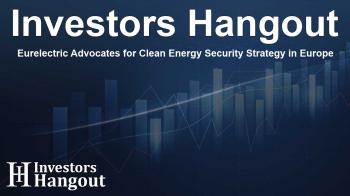Eurelectric Advocates for Clean Energy Security Strategy in Europe

Eurelectric's Call for Energy Security Transformation
In a rapidly changing energy landscape, Eurelectric is emphasizing the pressing need for Europe to adopt a revitalized energy security strategy, particularly focusing on clean electrification. The challenges facing the European energy system are unprecedented, exacerbated by geopolitical tensions and climate change impacts. With recent disruptions such as storm damage and international conflicts, the region's reliance on diverse energy sources has never been more critical.
The Current Energy Landscape
Europe's energy framework is evolving dramatically, with projections indicating that reliance on energy imports, which comprised 60% of the supply in 2022, will plummet to 13% by 2050. This significant drop is largely attributable to the electrification of various sectors including transport and heating. Furthermore, the transition to renewable energies is speeding up, with an expectation that renewables will generate approximately 69% of the continent's total power by 2030. This change necessitates a robust and integrated strategy to ensure energy security that aligns with the achievements in decarbonization.
Historical Context of Energy Security
Examining the historical framework, the existing energy security strategy was introduced in 2014 during a time when Europe was heavily dependent on Russian energy imports. As the economic landscape and global events transformed, it became clear that this approach was inadequate for upcoming challenges. The tumultuous events in Ukraine and recent volatility in energy prices highlight the urgent need for policy innovation and resilience-building strategies across Europe.
Strategic Pillars for Future Energy Security
The new study commissioned by Eurelectric presents three crucial pillars to fortify Europe’s energy security:
- Enhanced Planning: The study advocates for comprehensive preparedness frameworks that encompass the entire value chain. This involves integrating various energy vectors and infrastructure, extending planning horizons, and accounting for external threats to better identify system needs.
- Increased Flexibility: A substantial enhancement in flexible capacity is necessary to complement the growing share of variable renewable energy sources. Projections estimate that around 175 GW will derive from innovative storage technologies and demand-side responses by 2030. This flexibility will require crucial incentives and support mechanisms to stimulate investments.
- Operational Markets: Developing effective pricing signals is essential for reflecting the system's needs. Furthermore, it allows consumers to actively participate in the security of supply by adapting their energy usage according to market conditions.
Insights from Leadership
Leonhard Birnbaum, President of Eurelectric and CEO of E.ON, articulates the challenges ahead, emphasizing that the traditional methods of managing Europe's energy landscape are no longer viable. He remarks, "With the threats faced by our sector, security of supply is becoming an urgent priority that policymakers and regulators must acknowledge." This sentiment underscores the critical nature of the ongoing energy transition happening across Europe.
Moving Forward with a Clear Vision
As the urgency for action grows, leaders and decision-makers must ensure that Europe maintains a clear vision regarding its future energy security strategy. Birnbaum concludes the discussion with a call for commitment and innovation to navigate the complexities involved in this transformation.
The findings from the study are anticipated to be formally presented at a major security gathering, which will provide a platform for discussing these vital reforms for Europe's energy security.
Frequently Asked Questions
What prompted Eurelectric to advocate for a new energy security strategy?
The escalating challenges in Europe’s energy landscape, including geopolitical tensions and the need for rapid decarbonization, necessitate a new approach focused on clean electrification.
How significant is the shift in energy imports expected by 2050?
Energy imports are projected to decline from 60% in 2022 to just 13% by 2050, primarily due to electrification across key sectors.
What are the three pillars of the proposed energy security strategy?
The three pillars include enhanced planning, increased flexibility, and operational markets, which together aim to strengthen Europe’s energy supply.
What role do renewables play in Europe’s future energy supply?
Renewable energy is set to generate approximately 69% of Europe’s total power by 2030, significantly contributing to the reduction of fossil fuel reliance.
What is the importance of consumer participation in energy security?
Consumer participation through adaptable energy use based on market conditions can greatly enhance the overall security of energy supply across Europe.
About The Author
Contact Henry Turner privately here. Or send an email with ATTN: Henry Turner as the subject to contact@investorshangout.com.
About Investors Hangout
Investors Hangout is a leading online stock forum for financial discussion and learning, offering a wide range of free tools and resources. It draws in traders of all levels, who exchange market knowledge, investigate trading tactics, and keep an eye on industry developments in real time. Featuring financial articles, stock message boards, quotes, charts, company profiles, and live news updates. Through cooperative learning and a wealth of informational resources, it helps users from novices creating their first portfolios to experts honing their techniques. Join Investors Hangout today: https://investorshangout.com/
The content of this article is based on factual, publicly available information and does not represent legal, financial, or investment advice. Investors Hangout does not offer financial advice, and the author is not a licensed financial advisor. Consult a qualified advisor before making any financial or investment decisions based on this article. This article should not be considered advice to purchase, sell, or hold any securities or other investments. If any of the material provided here is inaccurate, please contact us for corrections.

